Mazda CX-30 vs Dacia Bigster – Differences & prices compared
Compare performance, boot space, consumption and price in one view.
Find out now: which car is the better choice for you – Mazda CX-30 or Dacia Bigster?
The Mazda CX-30 (SUV) comes with a Petrol MHEV engine and Manuel or Automatic transmission. In comparison, the Dacia Bigster (SUV) features a Petrol MHEV, Full Hybrid or LPG engine with Manuel or Automatic transmission.
When it comes to boot capacity, the Mazda CX-30 offers 430 L, while the Dacia Bigster provides 667 L – depending on how much space you need. If you’re looking for more power, decide whether the 186 HP of the Mazda CX-30 or the 155 HP of the Dacia Bigster suits your needs better.
In terms of consumption, the values are 5.70 L per 100 km for the Mazda CX-30, and 4.70 L for the Dacia Bigster.
Price-wise, the Mazda CX-30 starts at 25200 £, while the Dacia Bigster is available from 20600 £. Compare all the details and find out which model fits your lifestyle best!
Mazda CX-30
The Mazda CX-30 effortlessly combines sleek design with a sense of adventure, making it an appealing choice for urban explorers and countryside enthusiasts alike. Inside, the cabin is thoughtfully designed, offering both comfort and cutting-edge technology to enhance the driving experience. Its performance on the road is agile, providing a smooth and engaging journey for drivers and passengers.
details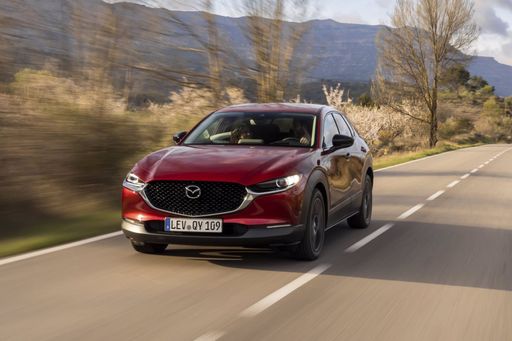 @ de.mazda-press.com
@ de.mazda-press.com
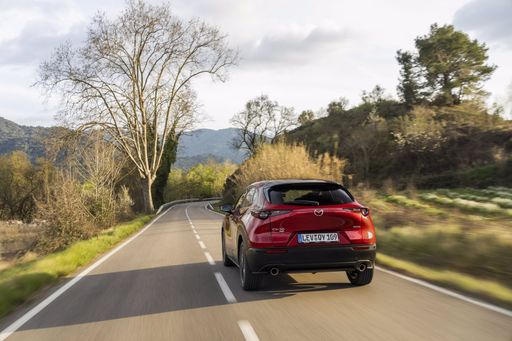 @ de.mazda-press.com
@ de.mazda-press.com
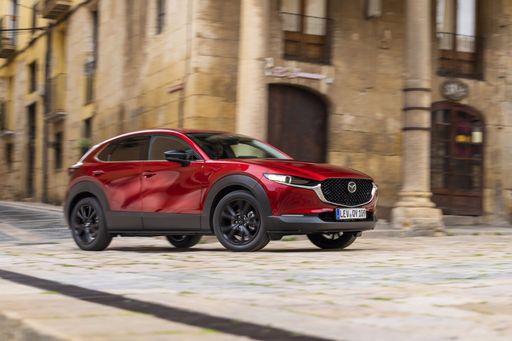 @ de.mazda-press.com
@ de.mazda-press.com
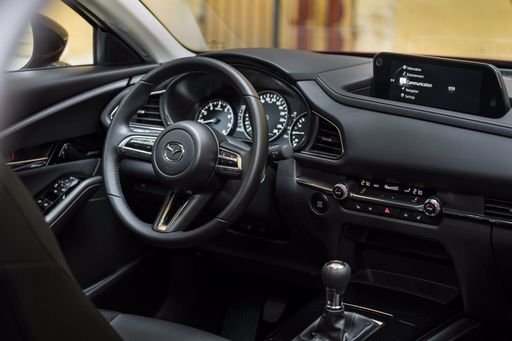 @ de.mazda-press.com
@ de.mazda-press.com
Dacia Bigster
The Bigster is poised to redefine the SUV segment with its bold design and spacious interior, catering to the needs of both families and adventure seekers alike. Emphasizing sustainability and practicality, this model reflects a modern approach to automotive engineering, making it a compelling choice for environmentally conscious drivers. With its striking presence on the road, the Bigster not only captures attention but also embodies a new era of versatile mobility.
details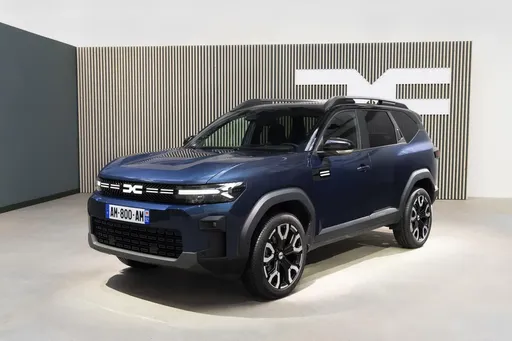 @ media.renault.at
@ media.renault.at
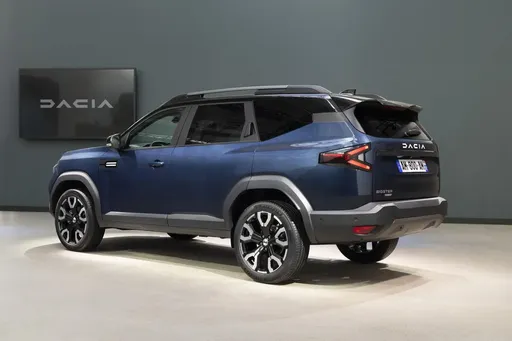 @ media.renault.at
@ media.renault.at
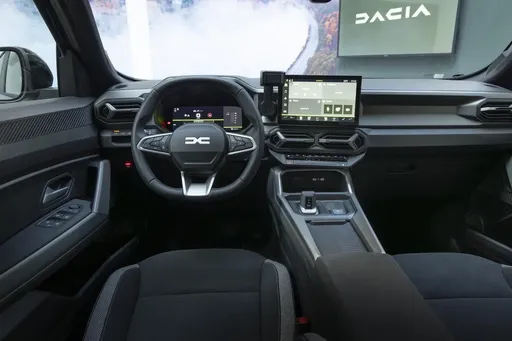 @ media.renault.at
@ media.renault.at
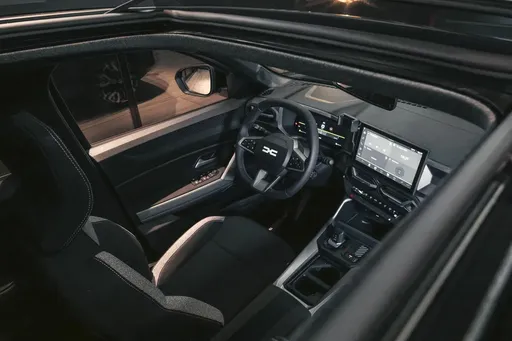 @ media.renault.at
@ media.renault.at
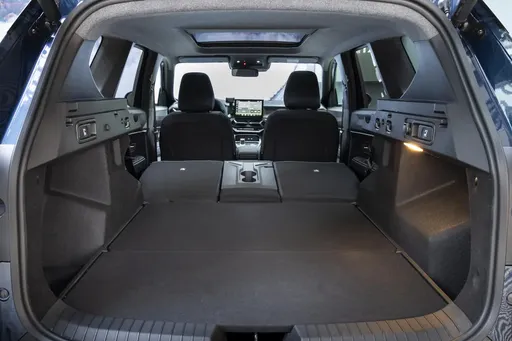 @ media.renault.at
@ media.renault.at

|

|
|
|
|
Costs and Consumption |
|
|---|---|
|
Price
25200 - 36800 £
|
Price
20600 - 26600 £
|
|
Consumption L/100km
5.7 - 6.6 L
|
Consumption L/100km
4.7 - 7.1 L
|
|
Consumption kWh/100km
-
|
Consumption kWh/100km
-
|
|
Electric Range
-
|
Electric Range
-
|
|
Battery Capacity
-
|
Battery Capacity
-
|
|
co2
129 - 148 g/km
|
co2
106 - 137 g/km
|
|
Fuel tank capacity
48 - 51 L
|
Fuel tank capacity
50 - 55 L
|
Dimensions and Body |
|
|---|---|
|
Body Type
SUV
|
Body Type
SUV
|
|
Seats
5
|
Seats
5
|
|
Doors
5
|
Doors
5
|
|
Curb weight
1455 - 1587 kg
|
Curb weight
1425 - 1547 kg
|
|
Trunk capacity
422 - 430 L
|
Trunk capacity
510 - 667 L
|
|
Length
4395 mm
|
Length
4570 mm
|
|
Width
1795 mm
|
Width
1813 mm
|
|
Height
1540 mm
|
Height
1705 mm
|
|
Payload
458 - 496 kg
|
Payload
383 - 467 kg
|
Engine and Performance |
|
|---|---|
|
Engine Type
Petrol MHEV
|
Engine Type
Petrol MHEV, Full Hybrid, LPG
|
|
Transmission
Manuel, Automatic
|
Transmission
Manuel, Automatic
|
|
Transmission Detail
Manual Gearbox, Automatic Gearbox
|
Transmission Detail
Manual Gearbox, Automated Manual
|
|
Drive Type
Front-Wheel Drive, All-Wheel Drive
|
Drive Type
All-Wheel Drive, Front-Wheel Drive
|
|
Power HP
140 - 186 HP
|
Power HP
130 - 155 HP
|
|
Acceleration 0-100km/h
8.3 - 10.3 s
|
Acceleration 0-100km/h
9.7 - 11.2 s
|
|
Max Speed
191 - 204 km/h
|
Max Speed
180 km/h
|
|
Torque
238 - 240 Nm
|
Torque
230 Nm
|
|
Number of Cylinders
4
|
Number of Cylinders
3 - 4
|
|
Power kW
103 - 137 kW
|
Power kW
96 - 115 kW
|
|
Engine capacity
1998 - 2488 cm3
|
Engine capacity
1199 - 1799 cm3
|
General |
|
|---|---|
|
Model Year
2025
|
Model Year
2025
|
|
CO2 Efficiency Class
D, E
|
CO2 Efficiency Class
E, D, C
|
|
Brand
Mazda
|
Brand
Dacia
|
Mazda CX-30
The Mazda CX-30: Where Innovation Meets Efficiency
The Mazda CX-30 stands as a testament to Mazda's commitment to blending the best of technology and design. Positioned as a subcompact SUV, the CX-30 delivers the practicality of an SUV with the agile driving dynamics of a smaller vehicle. As we delve into its technical and innovative aspects, the CX-30 showcases why it's a formidable choice in today's competitive automotive market.
Engine and Performance: Power Meets Efficiency
The heart of the Mazda CX-30 lies in its sophisticated engine offerings. At its core, the e-SKYACTIV-X engines provide a unique balance of performance and fuel efficiency. With 186 PS at your disposal, these engines optimise the combustion process, reducing both fuel consumption and emissions. The engine's mild-hybrid system further enhances its efficiency by capturing energy during braking, making it one of the more environmentally conscious choices on the market.
Transmission and Drivetrain Options
Buyers have the flexibility to choose between a manual or an automatic transmission, catering to diverse driving preferences. The available all-wheel drive (AWD) system provides enhanced stability and control, particularly useful in variable weather conditions or challenging terrains. Those preferring a classic driving experience can opt for the front-wheel drive (FWD) variants, which still deliver impressive traction and handling.
Design and Dimensions
The Mazda CX-30's dimensions—4395 mm in length and 1795 mm in width—offer a spacious and comfortable interior while maintaining a sleek and modern exterior design. Its aerodynamic form not only enhances its aesthetic appeal but also contributes to improved performance and fuel efficiency. The interior, adorned with high-quality materials, reflects Mazda’s dedication to creating a premium driving experience.
Interior Comfort and Technology
Inside, the CX-30 does not disappoint. With a cabin that seats five comfortably, it strikes an excellent balance between style and practicality. The infotainment system, replete with intuitive controls and connectivity options, ensures that drivers remain connected and entertained on the go. Additionally, advanced safety features bolster the confidence of any journey, safeguarding occupants and pedestrians alike.
Pricing and Model Variants
The Mazda CX-30 is offered in a variety of model configurations, each catering to different budgetary and feature preferences. The entry-level models provide excellent value, while higher trims, such as the Exclusive-Line and Takumi, offer luxurious enhancements and additional technology features. With pricing from €28,940 to €42,390, the CX-30 positions itself as an attractive option in its segment.
Conclusion: The Ideal Mix of Performance and Practicality
In summary, the Mazda CX-30 emerges as a versatile and appealing option for those seeking a compact SUV that does not compromise on performance or sophisticated engineering. Its combination of innovative technology, efficient powertrains, and driver-centric features make it a worthy contender in its class. Whether navigating urban landscapes or exploring rural roads, the CX-30 delivers an engaging and reassuring drive.
Dacia Bigster
Introducing the Dacia Bigster: A Game Changer in the SUV Market
The Dacia Bigster is poised to redefine the landscape of compact SUVs with its striking design, innovative technologies, and a variety of powertrains that cater to a broad range of consumers. As the automotive world continues to shift towards sustainability without compromising performance, the Bigster stands out with its thoughtful engineering and modern features.
Striking Design and Practicality
From the moment you lay eyes on the Bigster, you can see that it was designed with purpose. Its robust silhouette, bold front fascia, and wide stance convey a sense of strength and stability. With dimensions of 4570 mm in length, 1813 mm in width, and standing 1705 mm tall, the Bigster offers a spacious cabin that comfortably accommodates five passengers. Coupled with a trunk capacity ranging from 546 to 667 liters, this SUV is as practical as it is stylish, making it perfect for both city driving and outdoor adventures.
Powerful and Efficient Engines
The Dacia Bigster offers a range of engine options designed to meet diverse consumer needs. The line-up includes two petrol MHEV variants: the TCe 130 and TCe 140, both available in front-wheel drive and all-wheel drive configurations. These engines not only deliver robust performance, with outputs between 130 and 140 HP, but also prioritize fuel efficiency, achieving consumption figures as low as 5.5 liters per 100 kilometers.
For those seeking an eco-friendlier option, the Bigster also features a Full Hybrid variant, the Hybrid 155, which offers an impressive 155 HP with a fuel efficiency rating of just 4.7 L/100 km. Additionally, the ECO-G 140 LPG variant allows for even more cost-effective driving without sacrificing power, catering especially to environmentally conscious consumers.
Innovative Technology Enhancements
The Dacia Bigster is equipped with an array of advanced technological features aimed at enhancing the driving experience. Its comprehensive infotainment system integrates a user-friendly interface with smartphone connectivity, ensuring that drivers can stay connected while on the road. Safety has also been prioritized, with features such as advanced driver assistance systems designed to keep both the driver and passengers secure.
Performance Meets Efficiency
Performance is a central theme in the Bigster's engineering. The SUV boasts a range of acceleration times, with the TCe 130 reaching 0-100 km/h in approximately 11.2 seconds and the TCe 140 doing so in a swift 9.8 seconds. The Hybrid model enhances this performance even further, offering a 0-100 km/h time of just 9.7 seconds. With a maximum speed of 180 km/h, the Bigster is not only capable but also thrilling to drive.
Comfort and Versatility
Inside, the Dacia Bigster emphasizes comfort and versatility with a roomy cabin that features high-quality materials and modern finishes. The SUV is designed with adjustable seating configurations and ample legroom, making it ideal for both daily commutes and longer journeys. It's also worth mentioning that the vehicle's curb weights range from 1425 kg to 1503 kg, optimized for performance and efficiency.
Conclusion: The Future of Driving with Dacia Bigster
The Dacia Bigster is more than just a new SUV; it represents a significant step forward in blending efficiency, performance, and practicality in an ever-evolving automotive landscape. With various engine options, advanced features, and a commitment to sustainability, it is clear that the Bigster is designed to meet the demands of modern drivers while appealing to a wide audience. Whether you are looking for a reliable city cruiser or a capable outdoor companion, the Dacia Bigster is set to deliver on all fronts.
Is the Mazda CX-30 offered with different drivetrains?
Available configurations include Front-Wheel Drive or All-Wheel Drive.
The prices and data displayed are estimates based on German list prices and may vary by country. This information is not legally binding.
